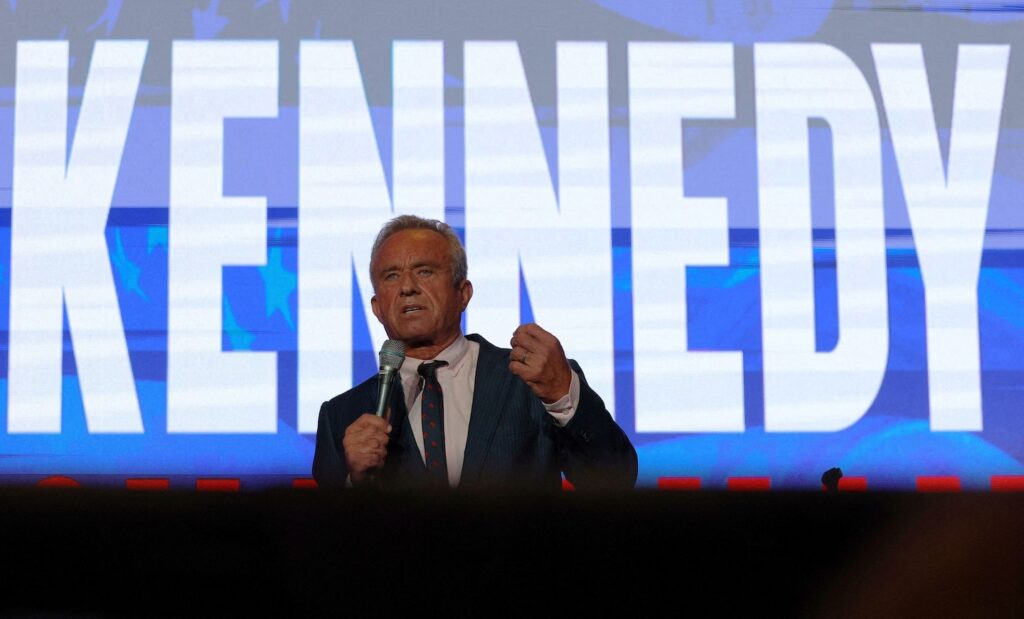“I want you to do something,” Trump told Robert F. Kennedy Jr. during the call, according to the video. “I think it would be a very good thing for you, a big thing, and we're going to win.”
To which Kennedy replied, “Yes.”
“We're way ahead of that guy,” Trump added, an apparent reference to President Biden.
It was not immediately clear what Trump meant by “doing something big.” His campaign did not immediately respond to a request for comment.
In the video, which was shared on X by Bobby Kennedy III but has since been deleted, Trump said “something is wrong with the whole system” while talking about vaccines.
“You're giving your baby 38 vaccines, Bobby. They're like vaccines for horses, not for a 10- or 20-pound baby,” Trump said, suggesting the baby could “change dramatically” later in life.
David Gorsky, a professor of surgery and oncology at Wayne State University and editor-in-chief of the medical misinformation journal Science-Based Medicine, said vaccines aren't as big a deal as Trump makes them out to be, and there's no evidence that childhood vaccination schedules with multiple shots in a row cause autism, a common tactic used by anti-vaxxers.
Bobby Kennedy III, who had spoken out about supporting his father's presidential campaign, wrote in a now-deleted post sharing the video that he “firmly believes these conversations should be had in public.”
“Here's Trump telling my dad the truth about vaccinating children. This was the day after the assassination attempt,” wrote Bobby Kennedy III. “This is not a cheap fake or someone doing a Trump imitation. This is the real deal.”
By Tuesday morning, the video had been removed and Robert F. Kennedy Jr. had apologized to President Trump.
“I was recording with our in-house videographer when President Trump called me,” Kennedy wrote in a post shared on X. “I should have instructed the videographer to stop recording immediately. I am embarrassed that this post was posted and I apologize to the President.”
During the call, Trump also recounted a conversation he had with Biden on Saturday after he survived an assassination attempt at a campaign rally in Butler, Pennsylvania.
A gunman attempted to shoot Trump, killing one rally attendee and wounding two others. Trump was taken to hospital and later said the bullet grazed his right ear, but his campaign did not provide details about his injuries.
Trump told Kennedy that in a phone call after the shooting, Biden asked him how he was feeling, and described his wounds as like being bitten by “the biggest mosquito in the world.”
Trump was seen with a bandaged ear injury. During his conversation with Kennedy, Trump described his call with Biden as “very good” and said the AR-15 gun that authorities believe was used in the shooting was “pretty tough.”
Bobby Kennedy III wrote in the post that Trump “could have chosen a unified candidate that included my father.”
Kennedy's Democrat critics have singled out his conversation with Trump as further evidence that he entered the race to damage Biden.
In a statement to the Washington Post, Democratic National Committee spokeswoman Lis Smith said Kennedy had “no path to win this election and is simply an obstacle to Trump's success.”
Trump's comments about vaccines during the call with Kennedy reflect his history of vaccine skepticism.
“They go into the hospital and they give you this giant shot. Have you seen the size of it? It's like a syringe. You know it's a terrible amount, but they inject it into this little body, and all of a sudden, a month later, the child is different. I strongly believe that's what causes it,” Trump previously told Fox & Friends in a 2012 call.
He has also tweeted anti-vaccine comments, claiming in 2012 that “massive combination vaccinations of young children are the cause of the sharp rise in autism. There is no scientific evidence that childhood vaccination schedules cause autism.”
During a 2015 Republican primary debate, he spoke out against childhood vaccination schedules, saying of some vaccines “it's like they're for horses, not for kids.”
Trump did not stick to his anti-vaccination beliefs during his presidency. “Indeed, the Trump administration has made efforts to speed up the development of a coronavirus vaccine,” said Gorsky, a professor at Wayne State University.
But “no one knows what's going to happen this time,” Gorsky said. “If the president is elected, he's likely to appoint people you know to head the Food and Drug Administration and the Centers for Disease Control and Prevention.” “You could imagine he would start pulling back on vaccines that are recommended by the CDC.”
Peter Hotez, a vaccine scientist and author of “The Deadly Rise of Anti-Science: A Scientist's Warning,” said this is part of an ongoing attack on vaccines that has become a regular Republican tactic.
“We've seen a steady decline in support for science in the wake of the COVID-19 pandemic,” he said.
Merrill Cornfield and Amy B. Wang contributed to this report.

